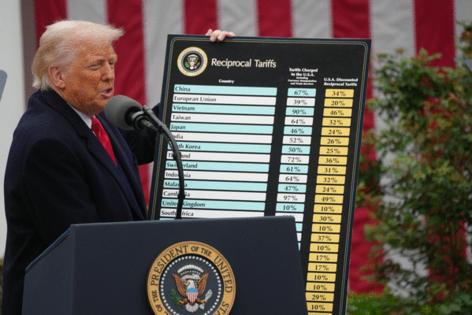Supreme Court to decide challenge to Trump's tariff power
Published in News & Features
WASHINGTON — The Supreme Court said Tuesday it would decide the legality of the majority of President Donald Trump’s worldwide tariff regime, a signature policy priority of the president.
The justices announced they will hear oral arguments in November on the Trump administration request to overturn lower court rulings that found the president exceeded his authority with his “Liberation Day” and other tariffs on countries worldwide.
The case is almost certain to be one of the most high-profile of the term that starts next month, as the justices decide the balance of power between the executive and Congress with major global trade implications and billions of dollars on the line.
The justices put the case on a faster timeline than typical cases, an indication that they might rule quicker than usual as well. They would be expected to rule before the conclusion of the term at the end of June.
The second Trump administration has sought to use tariffs as a major tool to address policies such as foreign drug imports and perceived trade imbalances. The administration has also touted billions in revenue from the tariffs.
In August, the Congressional Budget Office cited the Treasury Department as stating the tariffs brought in more than $130 billion in revenue so far this year, including $28 billion in July. The CBO also estimated the tariffs would result in $4 trillion overall in deficit reduction through 2035 if left unchanged.
The tariffs involved in the case, as well as most of the tariffs levied by the administration, are based on a law known as the International Emergency Economic Powers Act of 1977. That includes Trump’s so-called “Liberation Day” tariffs on most countries nationwide, as well as others imposed on China, Mexico and Canada.
The administration has argued that in emergency situations, such as facing large imports of illegal drugs or massive trade deficits, the president has the power to “regulate” imports, which includes setting tariffs.
Both the U.S. Court of International Trade and U.S. Court of Appeals for the Federal Circuit disagreed, finding that Congress did not give the president the authority to set tariff rates with the law.
Last month, a 7-4 panel of judges from the Federal Circuit issued a ruling invalidating the tariffs and setting up the Trump administration’s appeal to the Supreme Court. The majority wrote that the Constitution gives Congress the power over tariffs, and the 1977 law did not give the president the sweeping authority he claimed.
Administration officials said that invalidating the tariffs could reduce federal revenue by billions of dollars, undermine negotiations on trade deals predicated on the tariffs and result in billions in refunds to businesses who paid them.
The case is a combined challenge from states and businesses who argued that the tariffs violated federal law and the Constitution.
The cases are Donald Trump et al. v. V.O.S. Selections et al., and Learning Resources, Inc., et al. v. Donald Trump et al.
_____
©2025 CQ-Roll Call, Inc., All Rights Reserved. Visit cqrollcall.com. Distributed by Tribune Content Agency, LLC.







Comments